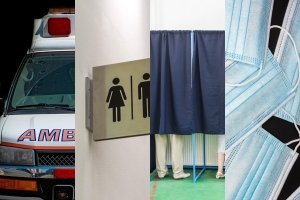Waiting for Ayotte: Will New Hampshire’s governor sign — or veto — these bills?

As we close out another legislative session in New Hampshire, we’re watching to see which of the remaining bills passed by the Legislature will be signed by Gov. Ayotte. If Gov. Ayotte signs these bills, they will become some of the newest laws in the Granite State, but their path from where they are now to the Governor’s desk isn’t as clear as you might think.
How does a bill get to the Governor’s desk?
After a bill passes both chambers, it disappears for a time, and it can be hard to track unless you’re carefully following hearings or floor debates. In fact, Rep. Lucy McVitty Weber even proposed a bill this year—HB 331—requiring the Secretary of State to publish the physical location of bills that have passed but not yet been signed or vetoed by the governor. In a Senate public hearing, Rep. Weber recounted how a bill once lost its way to the governor. Since the bill was particularly time sensitive, she went searching for it in the offices of the Secretary of State and Senate President, only to find the bill file sitting on a chair.
While delays in a bill getting a final decision from the governor are usually bureaucratic, sometimes they might be intentional. For example, Gov. Sununu waited months before signing a repeal of affidavit ballots for voters who show up at the polls without ID—HB 1569 (2024)—delaying its implementation until after the general election.
Bills waiting for Gov. Ayotte’s signature or veto
Here are a few of the notable bills we’re waiting for Ayotte to decide:
- SB 245: This bill would prohibit balance billing for ambulance service and set payment criteria providers would have to follow. The bill caused a lot of tension between cost-conscious Republicans and ambulance providers who argued too-low reimbursement rates would force them out of business. The final compromise set a higher default reimbursement rate – 325% of the Medicaid rate – but only for two years. Given Gov. Ayotte’s support for first responders throughout this year’s budget debates, it’s likely she will sign this bill.
- SB 284: This bill would limit local zoning laws from requiring more than one parking space per residential unit. Bills that push back on local zoning have caused a lot of debate among Republicans this year. Some argue these bills empower the state to take away local control, while others argue that restrictive zoning infringes on the right of property owners. Gov. Ayotte has not weighed in on this bill in particular, but she has generally sided with Republicans in favor of expanded housing rights, so it’s likely she will sign this bill.
- HB 148: This legislation adds an exception to state anti-discrimination laws for bathrooms, locker rooms, sports, prisons, hospitals, and treatment centers, allowing individuals to be classified based on biological sex. It is similar to a proposal vetoed by Gov. Sununu just last year, and it remains to be seen whether Ayotte will break from that precedent.
- HB 324: This legislation prohibits K-12 schools from making "any material that is harmful to minors" available to students. The bill defines this material to include various content related to sex. This bill also requires school boards to adopt complaint resolution policies to address complaints regarding harmful material by parents or guardians. Gov. Ayotte has already signed a Parental Bill of Rights, so she supports some pushback on local school policies, but she has not weighed in yet on this bill.
- HB 356: This bill would allow partisan school district elections. While proponents think this would help voters better understand candidates, critics worry it will bring unnecessary political rancor to these elections. This is another school-related bill that will shed light on Gov. Ayotte’s approach to education debates going forward.
- HB 361: This bill would ban mandatory mask policies in schools. Gov. Sununu vetoed similar legislation. Gov. Ayotte’s decision will indicate whether she’s sticking with Sununu on pandemic-era policies and local control.
These are just a handful of the many bills making their way from the New Hampshire Legislature to the governor’s desk. Gov. Ayotte has already issued her first veto (on HB 319, related to kindergarten busing requirements), so we know she won’t shy away from using the veto pen.
Want to learn more about tracking a bill through the New Hampshire legislature? Get started using our Advocacy Toolkit.











Comments
Login or register to post comments